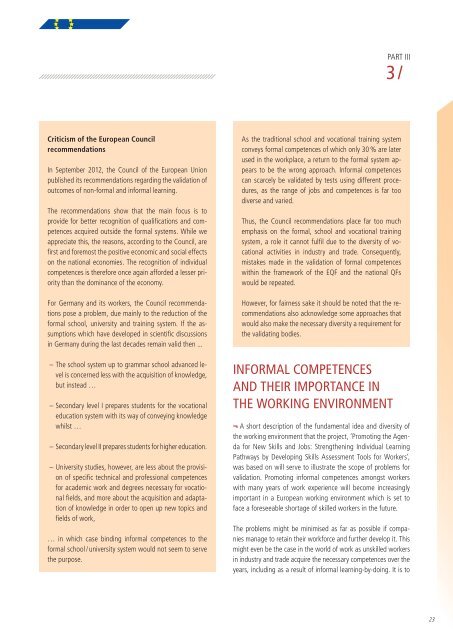RECOGNITION OF NON-FORMAL AND INFORMAL ... - Solidar
RECOGNITION OF NON-FORMAL AND INFORMAL ... - Solidar
RECOGNITION OF NON-FORMAL AND INFORMAL ... - Solidar
Create successful ePaper yourself
Turn your PDF publications into a flip-book with our unique Google optimized e-Paper software.
PART III<br />
3 /<br />
Criticism of the European Council<br />
recommendations<br />
In September 2012, the Council of the European Union<br />
published its recommendations regarding the validation of<br />
outcomes of non-formal and informal learning.<br />
The recommendations show that the main focus is to<br />
provide for better recognition of qualifi cations and competences<br />
acquired outside the formal systems. While we<br />
appreciate this, the reasons, according to the Council, are<br />
fi rst and foremost the positive economic and social effects<br />
on the national economies. The recognition of individual<br />
competences is therefore once again afforded a lesser priority<br />
than the dominance of the economy.<br />
For Germany and its workers, the Council recommendations<br />
pose a problem, due mainly to the reduction of the<br />
formal school, university and training system. If the assumptions<br />
which have developed in scientifi c discussions<br />
in Germany during the last decades remain valid then ...<br />
– The school system up to grammar school advanced level<br />
is concerned less with the acquisition of knowledge,<br />
but instead …<br />
– Secondary level I prepares students for the vocational<br />
education system with its way of conveying knowledge<br />
whilst …<br />
– Secondary level II prepares students for higher education.<br />
– University studies, however, are less about the provision<br />
of specifi c technical and professional competences<br />
for academic work and degrees necessary for vocational<br />
fi elds, and more about the acquisition and adaptation<br />
of knowledge in order to open up new topics and<br />
fi elds of work,<br />
… in which case binding informal competences to the<br />
formal school / university system would not seem to serve<br />
the purpose.<br />
As the traditional school and vocational training system<br />
conveys formal competences of which only 30 % are later<br />
used in the workplace, a return to the formal system appears<br />
to be the wrong approach. Informal competences<br />
can scarcely be validated by tests using different procedures,<br />
as the range of jobs and competences is far too<br />
diverse and varied.<br />
Thus, the Council recommendations place far too much<br />
emphasis on the formal, school and vocational training<br />
system, a role it cannot fulfi l due to the diversity of vocational<br />
activities in industry and trade. Consequently,<br />
mistakes made in the validation of formal competences<br />
within the framework of the EQF and the national QFs<br />
would be repeated.<br />
However, for fairness sake it should be noted that the recommendations<br />
also acknowledge some approaches that<br />
would also make the necessary diversity a requirement for<br />
the validating bodies.<br />
IN<strong>FORMAL</strong> COMPETENCES<br />
<strong>AND</strong> THEIR IMPORTANCE IN<br />
THE WORKING ENVIRONMENT<br />
¬ A short description of the fundamental idea and diversity of<br />
the working environment that the project, ‘Promoting the Agenda<br />
for New Skills and Jobs: Strengthening Individual Learning<br />
Pathways by Developing Skills Assessment Tools for Workers’,<br />
was based on will serve to illustrate the scope of problems for<br />
validation. Promoting informal competences amongst workers<br />
with many years of work experience will become increasingly<br />
important in a European working environment which is set to<br />
face a foreseeable shortage of skilled workers in the future.<br />
The problems might be minimised as far as possible if companies<br />
manage to retain their workforce and further develop it. This<br />
might even be the case in the world of work as unskilled workers<br />
in industry and trade acquire the necessary competences over the<br />
years, including as a result of informal learning-by-doing. It is to<br />
23
















